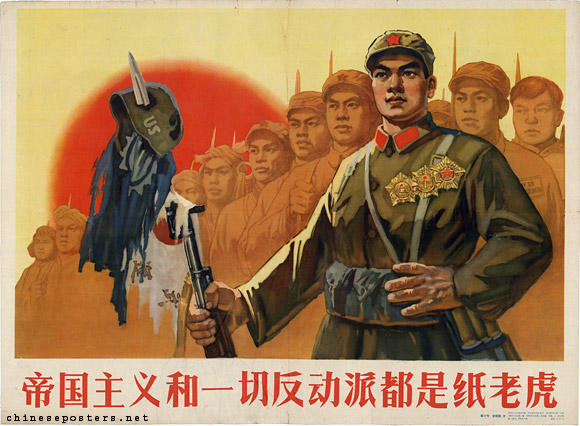More languages
More actions

Reactionary is an umbrella term for those whose political ideologies seek to conserve the current structures of power. In a Marxist context this means the total opposition to any revolutionary movements and upholding capitalism, liberalism, imperialism, fascism, monarchism and/or feudalism. Reactionaries are the contradiction to progressives (or simply progress), which dialectically tends towards socialism.
Reactionaries are usually conservative and hold a certain bygone era in high regard. This includes the veneration of classical art, traditional culture and appeals to religious thought. Certain reactionaries oppose anything that can be considered modern, but where they draw the line is often wherever is most politically convenient. In regards to reactionaries, their stance against socialism and communism is of the highest concern, but reactionaries also aim their hostilities toward any other movements or beliefs that threaten the bourgeois cultural and economic hegemony. This means an opposition to racial and national liberation movements, women’s liberation, queer rights movements, labor unions, modern art/music, and cultural movements, among others.
Reactionary anti-communism[edit | edit source]
Mao described reactionaries as paper tigers to mean that they look terrifying but are not as powerful as they seem.[1]
Liberals, who do not always consider themselves conservative, are at risk of becoming reactionaries at any time as they ultimately support capitalism (even if they would like a "more humane" capitalism). This is the reason behind the expression "scratch a liberal and a fascist bleeds."
Thus we have to differentiate between two types of reactionaries: the "soft" reactionary who only opposes progress in theory (towards socialism and communism) and the "hard" reactionary, usually fascists, who will take up arms and fight to conserve the status quo.
Self-described reactionaries[edit | edit source]
While most reactionaries do not identify as such, some on the far-right are self-aware enough to use "reactionary" as a self-descriptor. They are usually associated with the neo-reactionary (NRx) movement, a mostly online trend spearheaded by Curtis Yarvin whose main object of critique is democracy, both in its bourgeois and proletarian forms. The neoreactionaries have themselves been criticized for overestimating the stability of monarchy and for repackaging "scientific" racism as "human biodiversity."[2]
References[edit | edit source]
- ↑ “All reactionaries are paper tigers. In appearance, the reactionaries are terrifying, but in reality they are not so powerful. From a long-term point of view, it is not the reactionaries but the people who are really powerful.”
Mao Zedong (1946). Talk with the American Correspondent Anna Louise Strong. [MIA] - ↑ Klint Finley (2013-11-22). "Geeks for Monarchy: The Rise of the Neoreactionaries" Tech Crunch. Archived from the original on 2013-12-01.
